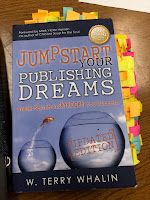What Can A Writer Do?
By Terry Whalin @terrywhalin
As a trained journalist, I continue to follow the news around me. I limit my consumption but I still follow the major events around the world. In many ways it is frustrating because as a writer, there is little I can do about it. Yet I can tap into one of the most powerful resource for every Christian: prayer. I continue to pray.
Through my work as an editor, I’ve learned that I can’t make people sign their contract. All I can do is faithfully work with my colleagues to get them a contract, then follow-up and answer any questions and encourage them to move forward. Last week an author told me his decision was between Morgan James Publishing and another publisher. He selected the other publisher (which I know is mostly smoke instead of actual publishing). My response to his decision: I wished him all the best and hope we can work together in the future. I’ve had authors who have published with that entity return to me with their next book for a different result.
As an editor, I can’t make authors market their book and tell others about their work. Last week I worked with another author on his second book with Morgan James Publishing. When I checked on the sales of his first book, I learned over the last couple of years, he had sold about 50 books in the bookstore. The bookstore sales number is key to the publisher--not what the author sells on their own. This news was dismal for his possibility of getting a second contract from my colleagues unless he has a different marketing plan.
The best publishing from my experience is working with a team. Sometimes like last week, my colleagues don’t like the writing--even if it is an unedited manuscript and I’ve referred this writer to some excellent editors. Not every pitch that I make to my colleagues gets a book contract. Yet I continue pitching different authors.
As people, God made us each with free will to make our own choices and sometimes learn our own hard lessons. Each day I try and use the hard earned lessons from my own publishing journey to help and encourage others even if they don’t take my advice.
I’ve given several examples here but bottom-line, there is much I can’t do in the publishing world. You may feel discouraged about the response or lack of response from editors and readers. My encouragement in this article is to keep going.
As a writer or editor, I can’t take on the responsibility of others--but I can take on my own responsibility. As Jack Canfield told us in The Success Principles, each of us have to take 100% responsibility for our own success. I can keep growing in my craft of writing and learn to be a better communicator and writer. If my books and book proposals aren't selling, then I can write something different like a short magazine article and get it into the market. I can create my own products and market them to my email list--even if I don’t like my open rate for my emails. I can keep expanding my personal connections to editors and other writers. I can continue pitching and looking for new opportunities.
As writers, the only way for our opportunities to dry up and stop is if we quit. Don’t quit and continue pressing forward. As I’ve written in these articles, we live in one of the greatest times in human history--but we have to take our own responsibility for our own actions and find the right place for our work to get published. It will not be easy and simple but is possible. If I can help you, don’t hesitate to reach out.
What can a writer do? Our writing can change our world but only if we continue the journey. What steps are you going to take this coming week? Let me know in the comments below.
Tweetable:
Labels: authors, consistency, contracts, editors, Jack Canfield, Morgan James Publishing, persistence, Terry Whalin, The Success Principles, The Writing Life, What Can A Writer Do?













































